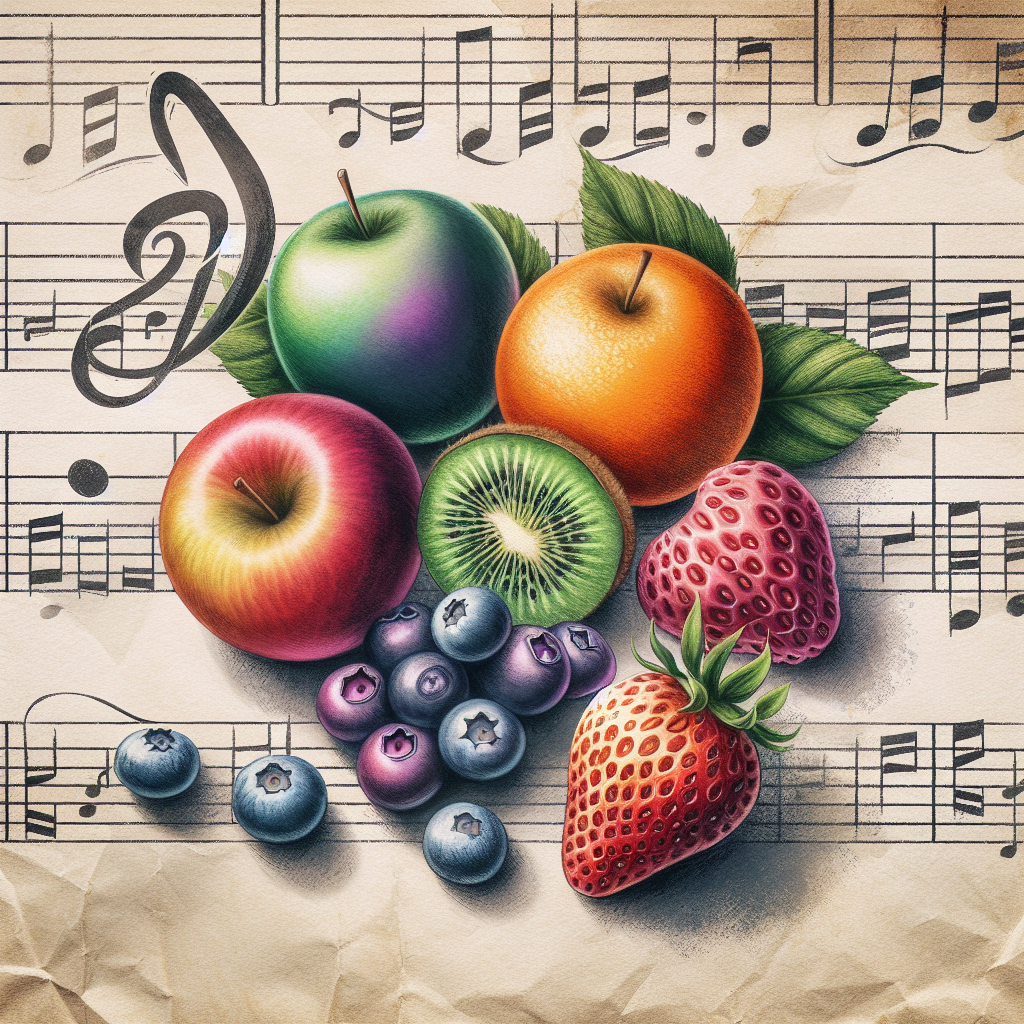The Connection Between Music and Vitamin Intake

Discover the fascinating connection between music and vitamin intake! Uncover how these two seemingly unrelated elements can impact your health and well-being. Visit My Vibrant Vitality now to learn more.
Exploring the Link Between Music Therapy and Vitamin Absorption
Music has long been recognized for its therapeutic benefits, offering a soothing balm for the mind and soul. However, recent studies suggest that the healing power of music may extend beyond the psychological realm, potentially influencing physical health by enhancing vitamin absorption. This intriguing connection between music and vitamin intake is a burgeoning field of research that warrants further exploration.
Music therapy, a clinical and evidence-based use of music interventions, has been shown to improve mental health, reduce stress, and even alleviate physical pain. It is a powerful tool that can stimulate various parts of the brain, triggering emotional responses and releasing endorphins, the body’s natural painkillers. But the potential benefits of music therapy may not stop there. Emerging research suggests that music could also play a role in the body’s absorption of essential vitamins.
Vitamins are crucial for maintaining overall health. They play a vital role in bodily functions such as metabolism, immunity, and digestion. However, the body’s ability to absorb these essential nutrients can be influenced by various factors, including stress levels. Chronic stress can negatively impact the digestive system, hindering the absorption of vitamins and leading to deficiencies. This is where music therapy may come into play.
Music has a well-documented ability to reduce stress and anxiety. By lowering stress levels, music could potentially improve the body’s ability to absorb vitamins. This theory is supported by a study conducted by the University of Miami School of Medicine, which found that patients who listened to music before, during, and after surgery experienced less stress and had higher levels of vitamin C than those who did not listen to music.
The study suggests that the calming effect of music may help to create a more optimal environment for vitamin absorption. When the body is relaxed, the digestive system is more likely to function efficiently, enhancing the absorption of nutrients from food. Therefore, incorporating music therapy into daily routines could potentially boost vitamin intake and contribute to better health.
However, it’s important to note that while the connection between music and vitamin absorption is promising, more research is needed to fully understand this relationship. The type of music, the duration of listening, and individual physiological responses are all factors that could influence the effectiveness of music therapy in enhancing vitamin absorption.
Moreover, while music therapy may aid in vitamin absorption, it should not be used as a substitute for a balanced diet or vitamin supplements if they are recommended by a healthcare provider. Music therapy is a complementary approach that can be used in conjunction with traditional medical treatments and healthy lifestyle habits.
In conclusion, the connection between music and vitamin intake is a fascinating area of research that could potentially revolutionize our understanding of health and wellness. While more studies are needed to confirm these findings, the existing evidence suggests that music therapy could be a valuable tool in promoting better vitamin absorption and overall health. So, the next time you’re feeling stressed, consider turning on some soothing tunes. Not only could it help to calm your mind, but it might also give your body a vitamin boost.
The Impact of Music on Vitamin Intake and Overall Health

Music has long been recognized for its therapeutic properties, with its ability to soothe the mind, uplift the spirit, and even heal the body. However, recent studies have unveiled an intriguing connection between music and vitamin intake, suggesting that the melodies we listen to may have a profound impact on our overall health.
The relationship between music and vitamin intake is rooted in the concept of music therapy. Music therapy is a well-established health profession that uses music to address physical, emotional, cognitive, and social needs of individuals. It has been found to stimulate the production of certain hormones and neurotransmitters in the body, which can influence our mood, stress levels, and even our appetite.
One of the key hormones influenced by music is serotonin, often referred to as the ‘feel-good’ hormone. Serotonin plays a crucial role in regulating mood, sleep, and appetite. When we listen to music we enjoy, our brain releases serotonin, which can make us feel happier, more relaxed, and less stressed. This positive mood can influence our eating habits, making us more likely to consume foods rich in essential vitamins and nutrients.
Moreover, music can also stimulate the production of dopamine, another neurotransmitter that plays a significant role in our reward and pleasure centers. Dopamine is often released when we eat foods we enjoy, contributing to feelings of satisfaction and pleasure. By listening to music while eating, we can enhance the release of dopamine, making the eating experience more enjoyable and potentially encouraging us to eat more nutrient-dense foods.
In addition to influencing our mood and appetite, music can also impact our digestion. The soothing effects of music can help to reduce stress and anxiety, which are known to interfere with digestion. By promoting a more relaxed state, music can enhance our body’s ability to absorb the vitamins and nutrients from the food we eat.
Furthermore, music can also play a role in our physical activity levels. Engaging, upbeat music can motivate us to move more, boosting our metabolism and aiding in the absorption of vitamins. Regular physical activity is essential for maintaining a healthy body and ensuring we are effectively utilizing the vitamins and nutrients we consume.
While the connection between music and vitamin intake may seem surprising, it is a testament to the powerful influence of music on our overall health. By incorporating music into our daily routines, we can enhance our mood, improve our digestion, and potentially increase our intake of essential vitamins and nutrients.
However, it’s important to note that while music can positively influence our vitamin intake, it should not be used as a substitute for a balanced diet and regular exercise. Consuming a variety of nutrient-dense foods and engaging in regular physical activity are still the most effective ways to ensure we are getting the vitamins and nutrients our bodies need.
In conclusion, the connection between music and vitamin intake offers a fascinating insight into the multifaceted role of music in our lives. It underscores the importance of music as a tool for promoting overall health and wellbeing, and highlights the potential benefits of incorporating music into our daily routines. Whether it’s listening to a favorite song while cooking a nutritious meal, or playing an upbeat tune to motivate a workout, music can play a significant role in enhancing our vitamin intake and promoting overall health.
Harmonizing Health: The Surprising Connection Between Music and Vitamin Intake
Music has long been recognized as a powerful tool for healing and wellness. Its ability to soothe the mind, uplift the spirit, and even stimulate physical responses is well-documented. However, a surprising connection has recently been discovered that links the world of music to something seemingly unrelated: vitamin intake. This intriguing correlation between music and vitamin intake offers a fresh perspective on how we can harmonize our health.
The connection between music and vitamin intake is rooted in the concept of bioavailability. Bioavailability refers to the proportion of a nutrient that is absorbed and utilized by the body. It is influenced by various factors, including the presence of other nutrients, the individual’s overall health, and even their emotional state. This is where music comes into play.
Research has shown that music can significantly affect our emotional state. A study published in the journal “Nature Neuroscience” found that listening to music can release dopamine, a neurotransmitter associated with feelings of pleasure and satisfaction. This emotional response can, in turn, influence the bioavailability of vitamins in our body.
When we are in a positive emotional state, our body is more likely to absorb and utilize nutrients effectively. This is because stress and negative emotions can hinder digestion and absorption, reducing the bioavailability of vitamins. On the other hand, positive emotions, such as those elicited by music, can enhance these processes. Therefore, listening to music while consuming vitamin-rich foods or supplements could potentially increase their effectiveness.
Moreover, music can also influence our eating habits, which indirectly affects our vitamin intake. A study conducted by the University of Cornell found that listening to soft, soothing music can slow down the rate at which we eat. This slower pace can lead to better chewing and digestion, which can improve the absorption of vitamins from our food.
Additionally, music can also encourage healthier food choices. Research has shown that people are more likely to choose healthier foods when they are in a good mood. Since music can enhance our mood, it can potentially influence us to opt for vitamin-rich foods, thereby increasing our vitamin intake.
However, it’s important to note that while music can enhance vitamin intake, it is not a substitute for a balanced diet. Consuming a variety of nutrient-dense foods is still the best way to ensure adequate vitamin intake. Music should be seen as a complementary tool that can enhance the effectiveness of a healthy diet, rather than a standalone solution.
In conclusion, the connection between music and vitamin intake is a fascinating example of how different aspects of our lives are interconnected. It underscores the importance of a holistic approach to health, where diet, emotional well-being, and even our choice of music are all considered. So, the next time you sit down for a meal, consider putting on some of your favorite tunes. Not only will it make your meal more enjoyable, but it could also help your body absorb more of the vital vitamins it needs.